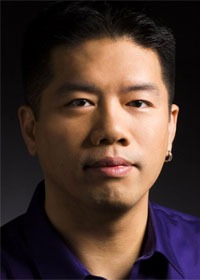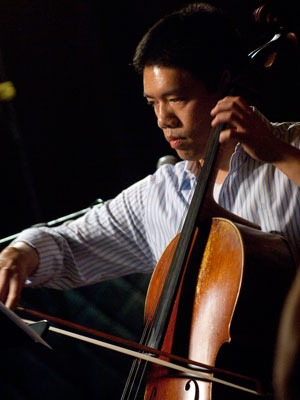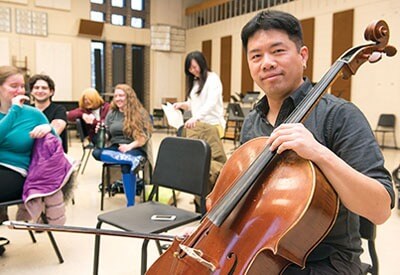For musicians, perfecting their craft is a lifelong symphony. Those best prepared to hit the right notes are dedicated, lifelong learners.
Cheng-Hou Lee, associate professor in the NIU School of Music, sets the stage for his students’ success.
“I tailor what I tell each student. I try to find the most efficient way for them to play their instrument. I try to help them find their voices,” Lee said.
An accomplished cellist and chamber musician who has performed and taught master classes all over the globe, Lee understands what it takes to be world-class musician. That includes helping his students understand their own motives.
“I have discussions with them about what music means to us. I help them understand the challenges involved in music and that their passion and commitment are keys to success.”
Lee knows about success and hard work. A native of Taiwan, he began playing cello at age 4. (“I always want to have a good story to tell people about how I started playing music but I can’t remember: I was so small,” he said.)
The son of an accomplished musician father, he left home for Long Island, N.Y., to study at a performing arts high school when he was 14. After earning his bachelor’s and master’s degrees at Julliard, and an additional master’s degree in chamber music at Rice University, he received his Doctoral of Musical Art at the New England Conservatory.
 He has taught master classes and appeared in hundreds of solo and chamber music performances throughout the United States, Germany, Italy, Hong Kong and Taiwan. He has performed with world- renowned artists including Yo-Yo Ma, and is the recipient of a career grant from the Quanta Education Foundation.
He has taught master classes and appeared in hundreds of solo and chamber music performances throughout the United States, Germany, Italy, Hong Kong and Taiwan. He has performed with world- renowned artists including Yo-Yo Ma, and is the recipient of a career grant from the Quanta Education Foundation.
He was appointed a faculty member in the NIU School of Music with the Avalon String Quartet in 2007.
“We enjoy his presence as an artist and collaborator of the highest caliber,” said Paul D. Bauer, interim dean of the College of Visual and Performing Arts and former director of the School of Music. “He is respected internationally as a solo cellist and chamber musician, and his experience as a student of, and performer with, musical luminaries such as Yo-Yo Ma, Janos Starker and Mstislav Rostropovich, means our students and community engage, through Cheng-Hou, in a remarkable musical legacy.”
Students who receive private cello instruction from him at NIU benefit from his rigorous experience and keen understanding of musical performance challenges.
“I try to engage students and discuss what the music is about, what the composer’s intentions were. It feels like the most natural thing … the impression you get from music. This is lively, this feels happy, this feels sad,” Lee said. “But musicians are so technical. Sometimes you forget what the most important thing is. You are thinking about where I’m supposed to place my arms, how long to hold a note … you forget this is a mysterious piece, or about angels singing.”
 Lee said his students find him tough.
Lee said his students find him tough.
“I don’t let anything go, but I’m supposed to tell them what to do. I don’t lose my temper, which is very different from the culture I grew up in. I used to get very, very nervous going to lessons and calling (instructors) on the phone,” he said.
Ya-Chen (Jessy) Lee, a graduate student of Lee’s, said that studying with him is one of her favorite things at NIU. He helps her understand the music, which allows her to learn faster.
“Cheng-Hou is very patient during lessons, and he discusses music with me when we have different opinions, instead of forcing me to play the way he likes me to play. He teaches me how to practice in a way that makes it more efficient, and makes my music more delicate and beautiful,” Jessy Lee said.
Cheng-Hou Lee, who gives private instruction to 10 students, said his favorite part about working with students is finding individual solutions to help them achieve their goals.
“It’s like a puzzle,” he said. “I have to figure out different things to say to different people even though they have the same exact problem. It helps me grow as a teacher, and also helps me as a player.”

